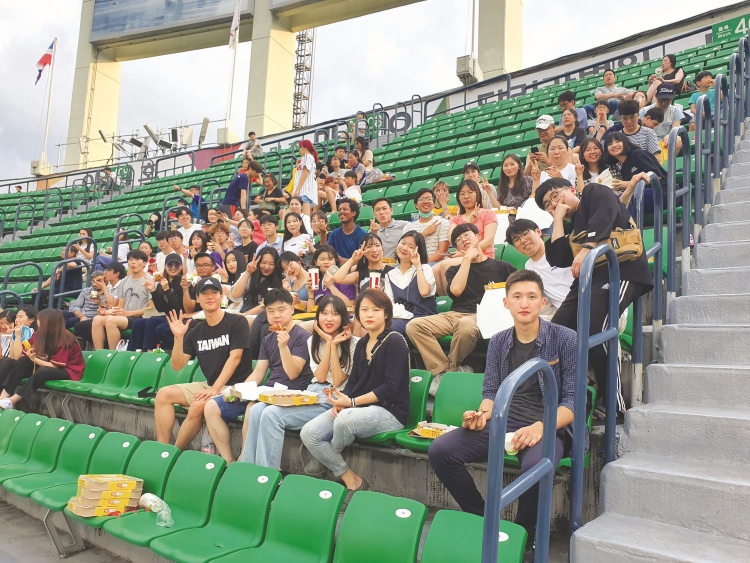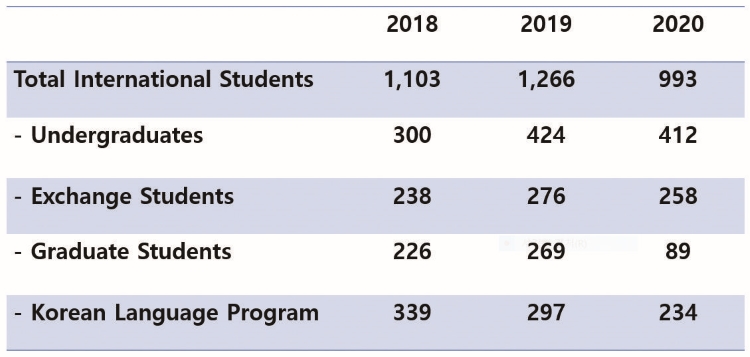

Reduction of Overseas Invited Exchange Students due to Covid-19
SeoulTech has continued toattract an increasing numberofinternational students over the years. International students who attend our university can be divided into undergraduate students, graduate students, Korean language program students, and exchange students. According to data from the Office of International Education about the number ofinternational students, exchange students have grown from 226 students in 2018 to 269 students in 2019. However, COVID-19 hashada negative impact on this growth. While the number of undergraduates, graduate students, and Korean language program students has remained consistent, fewer exchange students have come.
The graph below shows only 89 exchange students were invited in 2020,a significantly lower number than the previous years.
 ▲ Supplementary data that shows the numeric trend of international students at SeoulTech over the past three years.
▲ Supplementary data that shows the numeric trend of international students at SeoulTech over the past three years.
COVID-19 has impacted the countries that exchange students come from differently, so the possibility of traveling overseas has been dependent on thesituation and rules of each home country. Exchange students who have wanted tocome to SeoulTech may have had difficulties leaving their home country and entering Korea. However, as the COVID-19 vaccine becomes more widely available and more people receive a vaccine, the number of exchange students is expected to increase next semester. According to the Office of International Education, 120 exchange students will study at SeoulTech next semester, up from 50exchange students in Spring 2021. Therefore, SeoulTech needs to consider ways tobetter prepare forthe increase in exchange students by understanding how the university is currently supporting exchange students and what the students themselves think about their current living situation.
A Survey of Exchange Students' University Life Duringthe Pandemic
Exchange students, like the rest of the SeoulTech community, have had toadjust toa new normal during the pandemic. Life at SeoulTech this semester has been quite different compared to before the pandemic. Most classes have been run online, and outdoor activities have been limited. These adjustments will likely continue for exchange students next semester. In this situation, to providea better experience for future exchange students, we have to prepare well fortheir successful settlement in SeoulTech.
We decided to surveycurrent exchange students about their school life to get insights from those who are now experiencing SeoulTech life during the pandemic. This surveyran from April 28th to May 3rd. We asked 20 current exchange students at SeoulTech who had been studying here for one or two semesters to participate. 18 students responded.
First, we asked why the students chose SeoulTech during the pandemic. 55.6% replied that they chose SeoulTech because the university is located in Seoul. One added that he heard Seoul's quarantine prevention was better than other countries' capitals. 22.2% responded that theychose SeoulTech because it is a national university. One of themmentioned that since SeoulTech is the only national university in Seoul, he thought it wouldbemore alert to the pandemic situation. Lastly, 22.2% of the respondents said that SeoulTech was a partner school with their home university. The responses show some students chose SeoulTech based on concerns or beliefs about the pandemic situation.
Second, we wanted toknow if there isa gap between their ideal campus life and reality due to the pandemic. So, we asked what they expected about school life in Korea to investigate the gap between expectations and reality because of COVID-19. 55.6% replied they expected tohave Korean cultural experiences. 33.3% anticipated interactions with students from other countries. Over half of the respondents' expectations related to human interactions and experiences. Due to the pandemic, though, it may have been difficult to have as much interaction as they expected, so we asked whether they were satisfied with their current school life compared to the expectations they had. Surprisingly, all of the respondents replied 'Yes'. They said although they couldn't meet many people in Korea, SeoulTech notified them that a small group consisting of under four people could engage in activities. Thus, they were well-notified about quarantine rules and met with friends as much as they could. According to this question, we found out 'limited human interaction' was not a major problem. Based on the responses, we started to find other problems exchange students had.
For the third question, we asked the exchange students whether they were satisfied with their dorm life. 77.8% answered "Yes." Among the respondents, 85.7% were satisfied with the size of the room, and 14.3% were satisfied with the facilities of the dorm. However, 22.2% answered that they were notsatisfied with their dorm life. Half of the students who answered 'No' mentioned that their room was really dirty when they first got it. 25% of the students replied that they failed to secure a single room. And, the last 25% said that they were not notified about dorm scholarships. From this question, we realized that there are some common problems that exchange students are struggling with.
Lastly, we asked the exchange students about their best/worst memories in SeoulTech. About the best memory, they answered "Chill time near the pond during the cherry blossom season", "The convenience store is accessible throughout the night," "The way Korean students welcomed them at the beginning of the semester," and "Real small group meetings with classmates." About the worst memory, they replied "The dryer machine of the dorm didn't work," "Not being able to join a sports club," and "Poor organization of the buddy program."
These survey results givea sense of exchange students' concerns, dissatisfaction, contentment, and future expectations. According to this survey, exchange students are satisfied with SeoulTech activities even during the pandemic situation. At some points, however, they expressed some dissatisfaction with their dorm life.
It will be the first step to listen to the current exchange students' experiences and to correct the disappointment based on their opinions forproviding better experiences for future exchange students. Thus, we decided to interview an official with the SeoulTech dormitory tohearboth sides (exchange students and the dormitory staff) and consider areas both parties are concerned about. We will also describe the International Students' Club (ISC), which plans school activities for international students. These issues will continue in the next 'The SeouTech.'
Reporters,
Yougyeong Yoon geannie0611@seoultech.ac.kr
Gayeon Han hgy1228@seoultech.ac.kr




 Comment 0
Comment 0 Posts containing profanity or personal attacks will be deleted
Posts containing profanity or personal attacks will be deleted